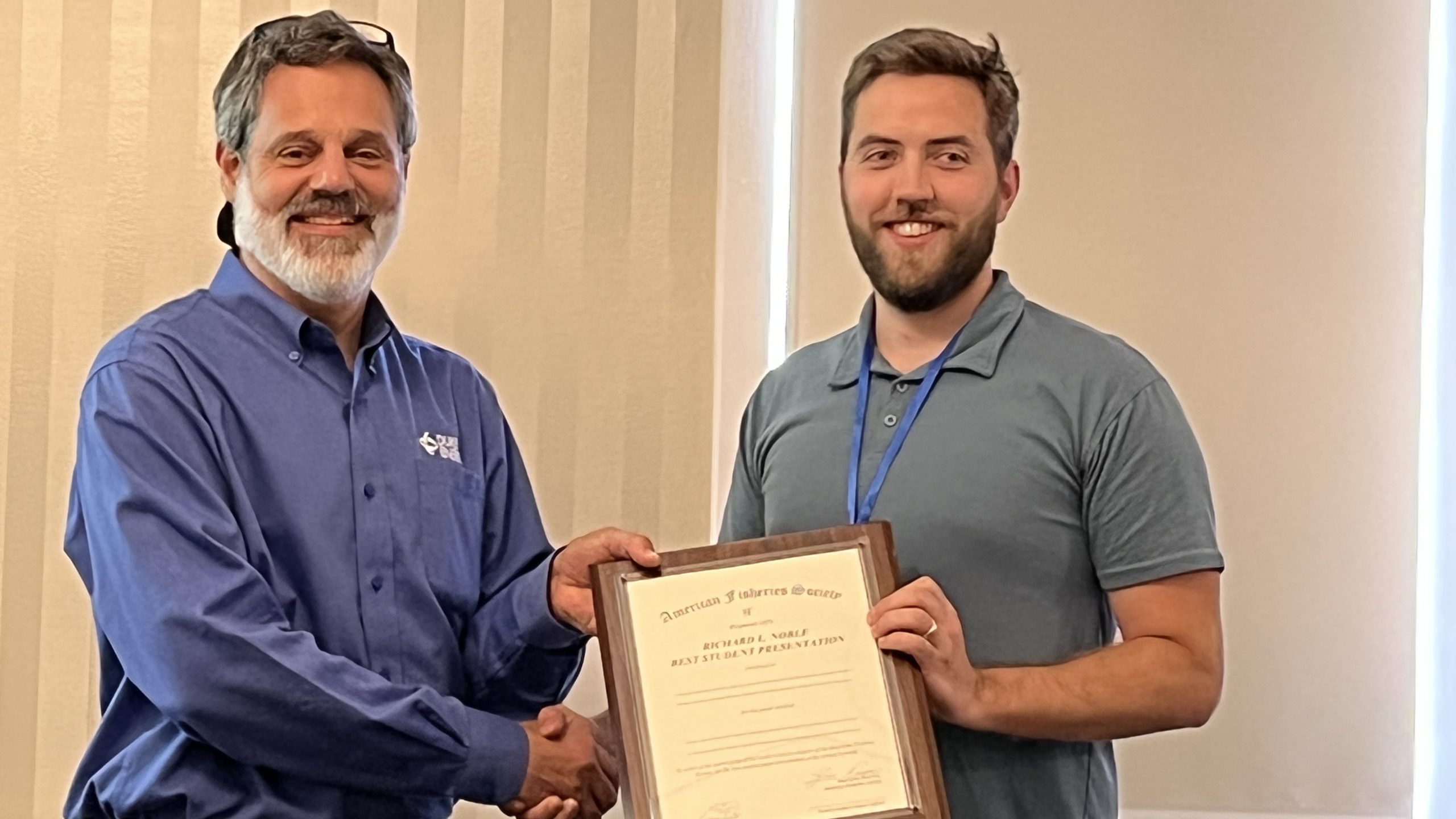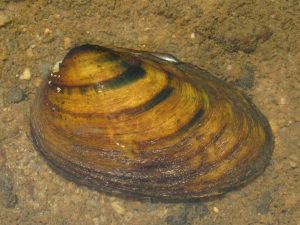NCSU Student Wins AFS Award for Presenting SE CASC Research on At-risk Freshwater Mussels

Joseph Mclver, a graduate student researcher for the SE CASC funded project, Impacts of Sea Level Rise and Associated Salinity Changes on At-risk Native Freshwater Mussels and Their Habitats in Atlantic Coastal Rivers, won the Richard L. Noble Best Student Presentation Award at the recent North Carolina Chapter American Fisheries Society Meeting for the talk, “Assessing the Toxicity of Sea Salt to Freshwater Mussels: Implications for Sea Level Rise in Coastal Rivers.” The following news release was written by Michelle Jewell for the NC State Applied Ecology News website and can also be viewed here.
Joseph Mclver Wins Richard L. Noble Best Student Presentation Award
Congratulations to graduate student, Joseph McIver for receiving the Rich L. Noble Best Student Presentation Award at the recent North Carolina Chapter American Fisheries Society Meeting! His award-winning talk was, “Assessing the Toxicity of Sea Salt to Freshwater Mussels: Implications for Sea Level Rise in Coastal Rivers.”
“Receiving this award from a group of my peers has encouraged me in my research,” says McIver. “It is nice to know that the time and effort I’ve devoted to this work has been recognized, and I am grateful.”
When asked about his origin story and how he became interested in studying mussels, Joseph provided the following: “I grew up exploring creeks and rivers, fishing, swimming, walking in the woods, outdoor activities etc… I knew a “desk job” was not for me. Eventually, I went to NC State where I obtained my B.S. in Fisheries, Wildlife, and Conservation Biology. This is where my love for complexity and beauty of the natural world really solidified. During and after completing my B.S. I had the opportunity to work with various graduate students studying freshwater mussels, sport fish, and non-game fish. A few years later I worked for the NC Wildlife Resources Commission as a technician in the Aquatic Wildlife Diversity program, where I worked with mussels most of the time. I enjoyed working with non-game aquatic species and felt that it suited my skill set. I knew I needed a M.S. to obtain a full-time position in the field, so I pursued that path. A few months after my tech position ended I got accepted into grad school at NC State, where I began my research on freshwater mussels and sea salt toxicity.”
Joseph’s M.Sc. research is supervised by Prof. Greg Cope.
Congratulations!
Presentation Abstract:

Freshwater mussels inhabiting coastal rivers can be negatively impacted by water salinization. Rising sea levels, storm surges, and drought are known to alter salinity concentrations in these systems. Sea salt is largely made up of sodium (Na + ) and chloride (Cl – ) ions, forming NaCl, a known toxicant to freshwater mussels. However, sea salt contains other cations and anions, such as potassium, sulfate, and calcium. The collective impact of these ions on freshwater mussel fitness is not clearly understood. Therefore, we conducted acute toxicity tests on early life stages (glochidia and juvenile) of 3 freshwater mussel species that inhabit Atlantic Slope drainages (Leptodea ochracea (from a riverine habitat and a lacustrine habitat), Ligumia nasuta, and Utterbackiana implicata). Glochidia (larvae) and juveniles of each species were exposed to 7 concentrations of Instant Ocean® Sea Salt, a synthetic sea salt. These concentrations were 0, 1, 2, 8.5, 12.5, 17, and 34 parts per thousand (ppt). Glochidia underwent a 48-hour acute toxicity test, where viability was assessed at hour 24 and 48. Juveniles underwent a 96-hour acute toxicity test, where viability was assessed at hour 48 and 96. We calculated the median lethal concentration (LC50) for each of the 8 acute toxicity tests and found that glochidia were more sensitive than juveniles to Instant Ocean® Sea Salt. LC50s for glochidia at hour 24 ranged from 0.45 to 3.95 ppt, with the most sensitive freshwater mussel being the Leptodea ochracea from the lacustrine habitat, exhibiting a LC50 of 0.45 ppt (95% C.I. = 0.39-0.51). Juvenile freshwater mussels exhibited 96-hour LC50s ranging from 5.04 to 7.90 ppt. Our results show that acute exposure to sea salt negatively impacts freshwater mussel viability, specifically glochidia. This information can be used to enhance freshwater mussel conservation strategies in regions that are impacted by seawater intrusion and inundation.
- Categories: